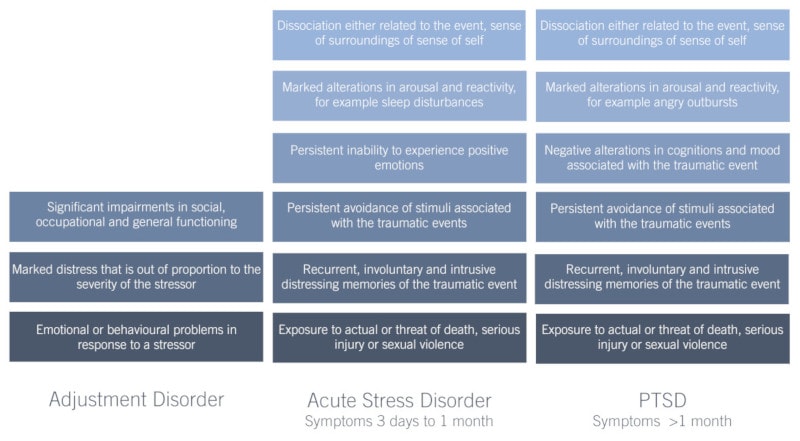Psychological assessments of trauma
Definitions of trauma
Psychological trauma is the overwhelming experience of extreme events that exceed a person’s ability to cope and integrate these experiences. Trauma affects individuals in different ways and there are a number of different diagnoses depending on the nature, severity and timescales of the symptoms of trauma.
Psychological interventions for trauma
Chartered Psychologists are trained to the highest level in diverse interventions for trauma, adjustment disorder, stress and associated diagnoses. Evidence has consistently indicated that the best results for treating trauma are achieved through individual trauma-focused treatments (Ehring et al., 2014).
 (Diagnostic criteria from DSM-V)
(Diagnostic criteria from DSM-V)
EMDR
Eye-Movement Desensitisation and Reprocessing therapy (EMDR) uses rhythmic bilateral stimulation including eye movement and sensory stimuli. The aim of EMDR is to change the way that a specific memory is stored and processed in the brain. EMDR uses a structured eight-phase approach through which the therapist will guide the patient through. Unlike other trauma-focused treatments, EMDR does not include extended exposure to the traumatic memories, challenging of dysfunctional thought processes or ongoing independent effort to change behaviour.
Since it’s conception in 1987, EMDR therapy has increased in awareness. It is now a well-regarded recommendation for individuals with trauma following incidents such as road traffic accidents and clinical negligence.
Trauma-Focused Cognitive Behavioural Therapy (TF-CBT)
TF-CBT is an evidence-based model of Cognitive Behavioural Therapy that has been adapted to the symptoms of trauma. The focus of CBT is to challenge trauma related cognition and offer tools to change thought processes. The model is a structured, short-term treatment method that has been proven to reduce a range of trauma-related symptoms in between 8-25 sessions. TF-CBT aims to provide psycho-education to children and adolescents suffering with PTSD and their caregivers, consequently equipping them with the skills to redesign their perception of the traumatic memories. The treatment has been shown to significantly reduce symptoms of PTSD, depression, anxiety, maladaptive behaviours, and negative emotions associated to trauma.
Counselling
Trauma therapists can assist an individual with trauma to explore distressing memories and dysfunctional thought processes. The therapist will offer exercises and tools that can combat states of hyper-arousal and affective dysregulation. Overcoming these challenging states allows the patient to process and understand trauma symptoms. The focus of counselling is to develop ways to work through traumatic experiences in a supportive environment. Furthermore, the flexibility in counselling makes it valuable for considering the social networks in a person’s life that can affect recovery. There are no guidelines on treatment longevity, and this is established according to individual requirements.
Practical application and assessment
The skill in assessing trauma, is to find the key to change. This key is found in people’s unprocessed memories, dysfunctional thoughts or even social networks. Therefore, a psychologist will take the individual’s history into account to ensure a holistic, trauma-informed approach.
The broader impact of trauma is an important consideration in psychological assessments. Trauma is one of the most common effects of injury or clinical negligence, with the impacts of the event(s) leading to further issues with functioning, employment, relationships, substance misuse and further complex mental health problems. Only through consideration of these factors can we develop a comprehensive understanding of how to effectively assess the impact of trauma and make predictions on the efficacy of treatment.
Find an expert witness with experience in psychological assessments of trauma

